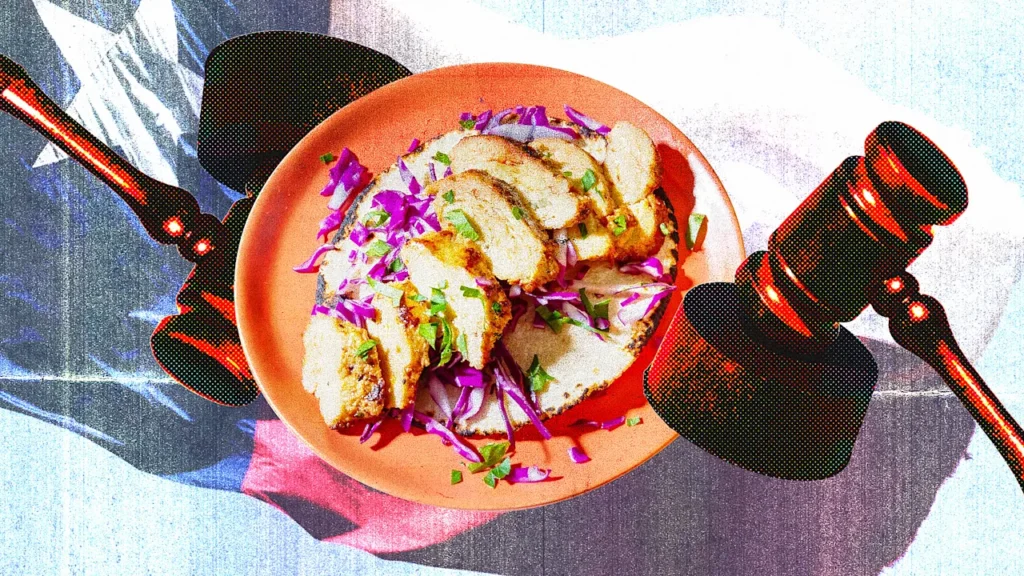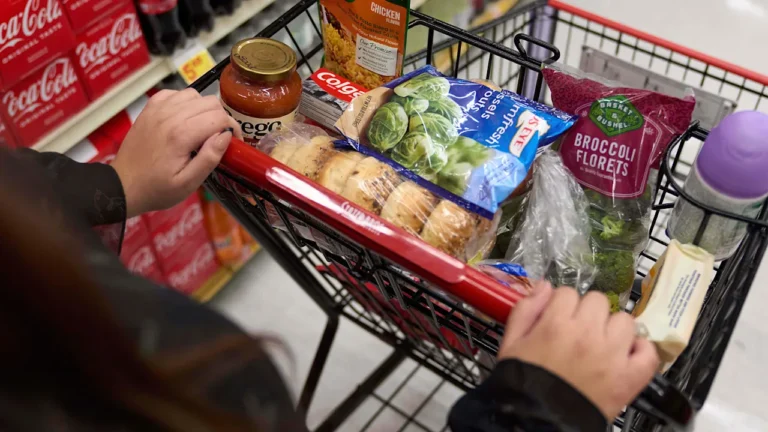
Cultivated meat—meat grown from cells, not from whole animals—isn’t yet a wide spread option in grocery stores or restaurants. The innovation, which involves growing meat from real animal cells without raising or slaughtering animals, is still relatively rare. But already, Texas lawmakers have decided to ban it it.
Now, two cultivated meat companies are fighting back with a federal lawsuit that challenges that ban. The Institute for Justice, a nonprofit public interest law firm, along with cultivated meat startups Wildtype and Upside Foods, argue that the Texas law is an unconstitutional move to protect the agriculture industry from competition.
“This law has nothing to do with protecting public health and safety and everything to do with protecting conventional agriculture from innovative out-of-state competition,” IJ Senior Attorney Paul Sherman said in a press conference Wednesday. (The USDA and FDA have approved both Upside and Wildtype’s cultivated meat as safe.)
“How do we know that?” he continued. “Because the sponsors of the bill made absolutely no secret of it. Repeatedly in committee hearings and on the floor of the Texas House, they said that the purpose of this law is to protect Texas’ agricultural industry, but that is not illegitimate use of government power.”
Cultivated meat has been offered in just one Texas restaurant: Otoko, a sushi restaurant in Austin, began serving Wildtype salmon this summer. But once the ban went into effect, that restaurant stopped selling it. By limiting what Texans can eat, the companies involved in the lawsuit say the ban is also a “slippery slope” toward handing over personal choices to the government.
Lawsuits against cultivated meat
Cultivated meat has faced lawsuits before. In 2024, Florida became the first state to ban cultivated meat; Alabama quickly followed suit. This year, lab-grown meat bans passed in Mississippi, Nebraska, Indiana, Montana, and Texas. (Cultivated meat bans have also been considered in a handful of other states, including Wyoming and Georgia.)
Some bans don’t bar lab-grown meat forever. The Indiana and Texas lawsuits prohibit the sale of cultivated meat for two years. The Texas bill, SB 261, was signed into law by Gov. Greg Abbott in June, and went into effect September 1. It imposes fines of up to $25,000 a day and even jail time for selling cultivated meat.
Texas is the largest beef-producing state in the country, with some 4 million beef cattle. The state’s Agriculture Commissioner applauded the ban, saying in a statement that it was “a massive win for Texas ranchers, producers, and consumers. … It’s plain cowboy logic that we must safeguard our real, authentic meat industry from synthetic alternatives.”
Cultivated meat companies fight back
To the companies that make this cultivated meat, these bans are clearly a way to protect the meat and ranching industry from competition.
Cultivated meat has been a burgeoning industry for about a decade, but it only recently received regulatory approval in the U.S. Upside Foods, which makes cultivated chicken, was the first to get that approval back in 2023. Wildtype, which makes cultivated salmon, received it in 2025.
To make cultivated meat, these companies grow the cells—whether from chickens or salmon—in big cultivators, usually with a blend of ingredients like amino acids and sugars. Wildtype CEO Justin Kolbeck likened the process to brewing beer. (Though cultivated meat has also been called lab-grown meat, Uma Valeti, CEO and founder of Upside Foods, has contested that label—it’s not made in a lab, he has said, but in a production facility like any other food.)
These companies are offering consumers a choice, they say—especially for people who may not want to switch to plant-based meats, but who still want to curb their meat consumption as a way to benefit the climate.
The lawsuit filed against the Texas ban challenges it under two constitutional provisions: the Commerce clause, which prohibits states from impairing interstate commerce, and the Supremacy Clause, which bars states from enacting laws that conflict with federal laws. The Poultry Products Inspection Act, for example, says states cannot enact requirements on ingredients in poultry products, or on the facilities and operations that produce them.
“For the same reason California cannot ban Texas beef in California, Texas cannot ban salmon or chicken from California,” Valeti said in a statement. “Texans deserve the freedom to decide for themselves what to eat without politicians choosing for them.”
Kolbeck from Wildtype also noted during the press conference that when it comes to seafood, America needs more stateside production. More than 80% of seafood on Americans’ plates is imported, and in April, the Trump Administration issued an executive order to “restore American seafood competitiveness.” “[We] are an American small business trying to do exactly what this executive order envisions,” he said.
In 2024, the Institute for Justice also filed a lawsuit in Florida, with Upside Foods, challenging that state’s cultivated-meat ban. In April, a judge denied the state’s attempt to dismiss the lawsuit, so it will move forward to trial court. The Texas lawsuit asks the district court to issue a preliminary injunction to block the ban, which would allow Wildtype and Upside to continue to make their cultivated meat available to Texans while the case continues.


